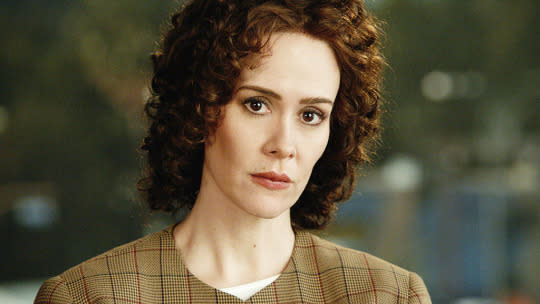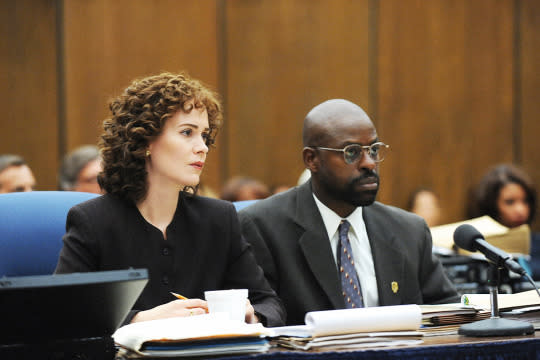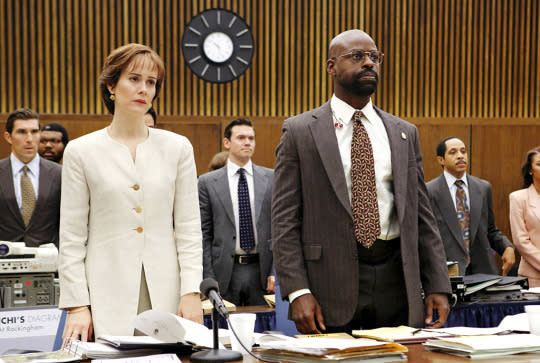'The People v. O.J. Simpson' Postmortem: Sarah Paulson Talks Portraying, Meeting, and Revering Marcia Clark

Warning: Storyline and character spoilers ahead for the “Marcia, Marcia, Marcia” episode of The People v. O.J. Simpson: American Crime Story.
There you have it, “Marcia, Marcia, Marcia,” the best episode yet of what has been FX’s completely addictive The People v. O.J. Simpson: American Crime Story miniseries. The writing, and the all-star supporting cast, of course, were great, but the standout, as she has been throughout the series, is Emmy and Golden Globe nominee Sarah Paulson and her portrayal of Simpson murder trial prosecutor Marcia Clark.
Related: Catch Up on ‘American Crime Story’ With Our Recaps
Paulson talked to Yahoo TV about what it was like to be Clark during the “Trial of the Century,” what it was like to play the much maligned prosecutor, and what it was like to meet the woman she admires like a “childhood idol.”
After “Marcia, Marcia, Marcia,” it feels like we all owe Marcia Clark a big apology.
I think so, too. I think that would be a really good idea.
Why do you think this story and this trial is still resonating with people after more than 20 years?
I sort of feel like it’s a combination of a bunch of things, but chiefly nostalgia, and the sort of unfinished business of it. A lot of people can identify where they were in their lives, their work lives, their married lives, their teenage lives, when this event took place. You can go right back to that moment in your life, and you’re interested in seeing what your big take is on it now. I think the other part is how it just doesn’t feel like it was ever resolved in a way that felt good or right to anyone, or to most people. Not to mention the idea that we were able to go behind the scenes, and see all the things that we didn’t know were going on, the conversations that were happening that we were not privy to. It takes you really inside the belly of the beast, and that’s a very different vantage point from which to see this.
Related: The ‘American Crime Story’ Cast Remembers Where They Were During the O.J. White Bronco Chase
Looking at this story now, what’s most striking to you about Marcia Clark’s experience? Do you think it would have been different if this were happening now?
I think the truth of the matter is that Marcia worked for the county, for the city of Los Angeles, and was a civil servant who never signed up to be in the public eye. She had had one very high profile case, the Rebecca Schaeffer murder, and won 19 out of 20 cases before the O.J. trial. She was incredibly competent, very good at her job, and her physical appearance was never of great concern to her. It was not the guiding force behind her wardrobe choices, or her hairstyle. The guiding force behind all those decisions were ease and simplicity, because she had young children, and that kind of awareness was not part of her language, nor should it have been.
The main difference, I think, is that today, she would have felt more communal support from social media. I think there would have been blogs written and dedicated to her terrible treatment, and the sexism that was very clearly being perpetrated against her daily in that courtroom, and by the media, in general. I think there would have been places where people could have publicly been talking about it. It might have changed a little bit of the dialogue and the conversation. We didn’t have [the Internet]… anyone who [talked] to the media about it, all they wanted to do was slam her. Everybody was looking for someone to blame for how this wasn’t working out the way most people thought it should, and what people don’t understand is how much of this trial was really being tried in the court of public opinion, and not in the courtroom. There was so much evidence that was not even allowed in front of the jury that would have probably changed things. [Judge Lance] Ito made some decisions that kept some very key pieces of evidence away from the jury. I don’t know what would have been different. My hope is that Marcia wouldn’t have felt so alone, so on her own out there.

The biggest takeaway from “Marcia, Marcia, Marcia” is how little we really knew about just how much pressure Marcia Clark was under, from so many different sources: her ex-husband, who was publicly airing their custody issues; her boss, who was recommending she see a style consultant; Judge Ito; the media and public’s scrutiny of every aspect of her appearance; and being a single mom with two young sons. How did she get through this, every day, for a year?
I think the thing that we do with most people we watch who are people we don’t know on television is that we assign certain beliefs or character traits to them, even though we’re guessing, based on what we perceive their behavior to mean, or to be. The truth is, I feel like somehow we let Marcia become a kind of animatron. She wasn’t a person to us… she was not real. She was a cardboard cutout of a person. You could say whatever you wanted about her, you could have as many opinions as you wanted about her and just say them publicly, and people would forget that this is a woman who… You asked the question, “How did she make it through?” When we were shooting this episode, I thought every single day, “I do not know how she did this.” Two tiny children at home, an ex-husband who was not protecting her, people at work deciding that she should look different, be different, smile, wear a different outfit, being just pummeled and raked over the coals at every turn… not to mention, when was she was supposed to be sleeping? When was the time where she was supposed to rest? I guess she was supposed to not… she was supposed to be trying on different lipstick colors instead of sleeping, I suppose, you know?
Related: ‘The People v. O.J. Simpson’: Follow the White Bronco Chase With Our Minute-By-Minute Map
I don’t know how she did it. I don’t know how she put two feet on the ground. I don’t know how she put her head down and focused on what she needed to focus on. It’s why she had the job and I didn’t, because I just would never have been able. I would have fallen apart. She’s a much stronger woman than I could ever dream to be, really and truly.
You met with her, and had a great discussion with her. Was that before or after you filmed this episode?
After.
Were you happy that you had waited to meet with her until after you’d filmed “Marcia, Marcia, Marcia”?
I am glad that I waited. I was a bit of a fan person when I met her, because I had just finished shooting this episode, and I had, through the course of shooting all the episodes prior to this one… by the time you get through [“Marcia, Marcia, Marcia”] there’s a whole new Marcia in terms of what we know as an audience, and what I, as an actress, knew about Marcia. The playing of it is very different than reading about it. Reading the script, reading [Jeffrey Toobin’s] book, reading her book, it’s very different to then put those shoes on and portray these events, reenact them. What it felt like to me was a very, very big deal, and I had so much compassion, and empathy, and feeling for her, that when I met her it was if I was meeting, I don’t know, like some childhood acting idol of mine, someone that I revered to the point of, “I can’t even look at you or I’m going to start to cry.” Because I knew how far we had taken it in that episode, and how deep we went, and how emotional it was. I just felt very close to her, and I just… more than anything what I want for Marcia is for Marcia to have what is due her, which is kindness, empathy, and understanding about what it would be like for a woman at this time to be going through all that she was going through privately and publicly, and still try to do her job.
Related: The O.J. Simpson Case: 15 Things You Might Have Forgotten (or Never Knew)
The thing that people forget about this trial is that two people are dead. Those children do not have a mother. Ron Goldman’s family does not have a son, or a brother. He never got to be a father. There’s just so much life that was snuffed out so quickly that this is, in fact, what all of Marcia’s work [was about], the relentless pursuit of justice. She was cut off at every turn in all different ways, and in the media was vilified and portrayed in an incredibly… a mockery was made of her as a person. She was so sharply drawn, and I don’t mean that in an acute way, I mean in a hard way, and I don’t think it was fair. What I hope is that there’s a little bit more clarity around the fact that Marcia Clark is a person, and had to endure something that most of us couldn’t even imagine, and wouldn’t have been able to get through one day of much less over a year of.
What did it mean to you to find out that Marcia Clark — I think she used the word “honored” — was happy with your portrayal of her and that she likes the series, which is a pretty big statement from her?
It’s a big statement coming from a person, I think, who the very thought of this being something she was going to have live through again was a very, very daunting one. To me, it was tantamount to having Meryl Streep say, “You were great in that movie.” That’s what it’s like to me, because I have that much respect, and that much… I just revere her mind, and spirit, and heart. I just really do, and it was an enormous honor to play her. She taught me a lot. I don’t think I’ll be the same person or the same actress that I was before, going forward.
Related: The O.J. Simpson Trial: Where Are They Now?
It’s given me a very new perspective. Whenever anybody makes a comment to me, a sort of gossipy comment to me about a person, or the way a person… they think behaved in a certain way, or did a certain thing, I always think, “You know, you don’t know what that person is going through. You do not know the whole story.” I’m not saying that in some kind of holier than thou way, that I’m not interested in some good gossip, because I like it as much as the next person, but I just mean, internally for me, my ability to push past what’s seemingly on the surface, and really ask more questions. That’s the main thing. Nobody was asking any deeper questions [about Marcia Clark]. I certainly didn’t. Whatever was being thrown down my gullet about who Marcia Clark was by the media at that time, I just ate and slurped up willingly. I didn’t ask any questions, and that’s the real thing that I think was the big failure, that all women at that time did a great disservice to her. People were not asking the question of why we’re talking about her goddamned hair when two people are dead. Think about what Marcia Clark is trying to do here. Why are we talking about the length of her skirt? Why are we talking about how she’s too tough? How should she behave as a woman trying to prosecute a murder case? What is she supposed to do, put on a frilly dress, and a bow in her hair to make everyone [happy]… then what? Then everyone says, “Oh, she’s not tough enough.” She’s stuck between a rock and a hard place. There was no way out for her. The whole thing gets me really riled up on her behalf, I have to say.

The scene where the grocery checkout guy makes the remark about tampons, while she’s just seen the tabloid magazines that are making fun of her on the covers, it must have just been deflating.
Yeah! Just to be a person walking around without any armor, not a person who grew up on a movie set and with people writing about her, untrue things being hurled around, and that just being part of the landscape. That’s just not the world she was living in. It’s not the language she spoke, and she wasn’t interested in it, so I don’t think she did it very well, nor should she have. That’s not a criticism of her. She shouldn’t have been well versed in the ways of maneuvering around all these public assessments of her, and conversations about her, and how to fight back. Marcia was focused on doing one thing: putting the facts in front of the jury, because the facts spoke for themselves. She didn’t do that razzle dazzle, the Johnnie Cochran, Dream Team-style courtroom antics. It wasn’t her style, and if people want to fault her for that, and if they thought she should have played a little more dirty, then that's… Marcia Clark has a very high functioning, very well maintained moral compass, and she just wasn’t going to do that.
The People v. O.J. Simpson: American Crime Story airs Tuesdays at 10 p.m. on FX.

